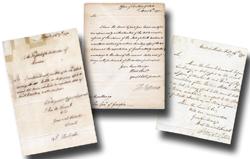
Washington, George and Thomas Jefferson and Samuel Huntington. 1st President of the United States (1789-1797); 3rd President of the United States (1801-1809); Governor of Connecticut and Signer of the Declaration, respectively.
In 1585 and 1587, the first English settlers in America established colonies on Roanoke Island off the North Carolina coast. The first group returned to England, while the later group vanished from the island, leaving behind only the words "Cro" and "Croatoan" carved in the trunks of two trees. From this original settlement, known as The Lost Colony, came the first child born to English parents in America, Virginia Dare. The region which was to become North Carolina was first established as an English proprietary colony in 1663-65, and its early history was the scene of Culpepper's Rebellion (1677), the Quaker-led Cary Rebellion (1708), the Tuscarora Indian War (1711-13), and ongoing pirate raids. The colony sent delegates to Philadelphia to attend the First Continental Congress in 1774, and on April 12, 1776, North Carolina became the first colony to instruct its delegates to vote for independence. Later that year, North Carolina adopted its first constitution. During the American Revolution, there was relatively little fighting within the colony, but many North Carolinians fought elsewhere. North Carolinians delayed approving the United States Constitution because they opposed a strong federal government; at the Hillsboro Convention of 1788 they rejected the Constitution and suggested many amendments to it. The Bill of Rights, proposed by Congress in 1789, incorporated some of these suggestions, and North Carolina finally ratified the Constitution on November 21, 1789, becoming the twelfth state in the Union. Offered here are three letters concerning the establishment of North Carolina as the twelfth state.
A. WASHINGTON, GEORGE. Document Signed as President. One page, Quarto, "United States Feby 26th, 1790." Addressed to an unknown correspondent (one of the Governors of the twelve "United States"), President Washington's letter reads in full: "Sir, I have the honor to transmit to your Excellency an Act passed in the second Session of the Senate and House of Representatives of the United States -- entitled 'an Act for giving effect to the several Acts therin mentioned, in respect to the State of North Carolina, and other purposes.' I have the honor to be, with due consideration your Excellency's Most Obedient Servant G:Washington." This letter of transmission accompanied copies of acts which had been passed by Congress some time previous, and which were now to be applied to North Carolina, following its November admission into the Union as a new State. Letter shows faint age-toning, with weakened folds (some minor fold strengthening on verso), else fine. Boldly penned in Washington's elegant hand.
B. JEFFERSON, THOMAS. Letter Signed as Secretary of State. Two pages (including docketed integral blank), Quarto, "Office of the Secretary of State -- April 6, 1790." Similar to the Washington letter above. Thomas Jefferson forwards to George Walton, Governor of Georgia (and presumably to all other Governors of the existing States) copies of acts which pertain to the newly-admitted State of North Carolina. The letter reads in full: " ... Sir - I have the honor to send you herein inclosed two copies duly authenticated of the Act to accept a cession of the claims of the State of North Carolina to a certain district of western Territory; also of the Act to prevent the exportation of Goods not duly inspected according to the laws of the several States, and of being with sentiments of the most perfect respect, Your Excellency's Most Obedt & nost h'ble Servant Th: Jefferson." Moderate browning, but very boldly penned and legible.
C. HUNTINGTON, SAMUEL. Autograph Letter Signed as Governor. One page, Quarto, "Norwich, Feby 27th, 1790. To the President of the United States of America." By this letter, Governor Samuel Huntington acknowledged to President Washington the receipt of the copies of Acts now pertaining to the new State of North Carolina. In full the letter reads: "Sir I am honored with your letter of the 20th Instant covering an Act Entitled an Act for giving effect to several Acts therein mentioned in respect to the State of North Carolina, & other purposes. With the greatest Respect & Consideration I have the Honor to be your most obedient Servant S. Huntington."
The Huntington letter is moderately and unevenly browned, with expert repairs to two sections of paper loss at the upper edge, not affecting the text, and two separated folds. Ink has slightly feathered, but letter is perfectly legible.
Each letter is bound in a three-fold custom-made cloth-and-morocco binder identifying the contents in gold lettering on its spine. Each includes a matted, color-tinted steel engraving, and a mounted transcription of its contents, as described above. These three items in combination constitute a benchmark in the history of statehood for North Carolina.
Estimated Value $50,000-UP.
Ex Superior Galleries February 2, 1994 Auction, Lot # 343.
